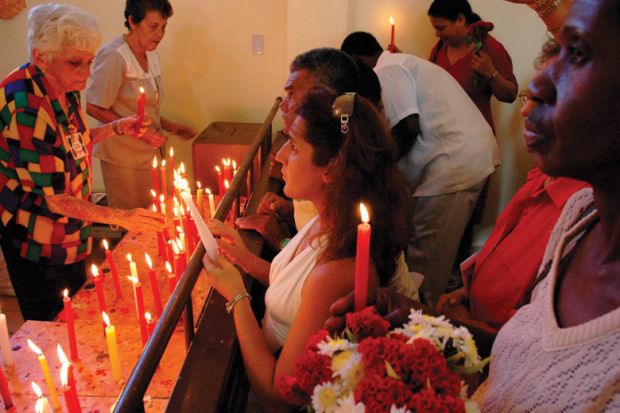Religious pluralism has become increasingly appealing to a new generation of Americans, particularly those who feel marginalised by organised religion. One such alternative is Lukumi (also known as Santería), based on devotion to the Orishas, African deities ruling over both human and natural attributes. It came with enslaved people to the Caribbean and South America, and travelled to the US via migrants from Cuba (where the religion is very strong) over the past 50 years. Many African Americans, desirous of connecting more deeply with their ancestral heritage, have also gravitated to the faith.
Sociologist Lynn Carr allows us a peep into this world by focusing on one of the most intense rituals that many Lukumi faithful undergo – the yaworaje, or initiation to priesthood. The title of Carr’s book refers to an obligatory one-year period of dressing only in white to which all novitiates must commit, alongside additional requirements such as sleeping and eating on a straw mat, not looking in a mirror, and having to cover one’s head at all times. During this period of spiritual rebirth, iyawos are considered infants, in need of protection and guidance.
Carr herself underwent initiation to Lukumi, and here she offers both an insider and outsider perspective (initiate and researcher) that allows us to be privy to the trials and triumphs, the struggles and joys of committing to a faith largely misunderstood and often disparaged by the American mainstream. A Year in White reveals the voices of almost 250 Lukumi faithful she interviewed or surveyed; they describe the meaning of that year for them and how it was often a pivotal moment in their lives.
I admire Carr’s ability to cover all bases, and her attention to detail is astute. She delves into a variety of subtopics: how iyawos are treated by co-workers, family members and the general public, how they find community (or not) within the religion, and perhaps most importantly, the development of a meaningful relationship with the Orishas. Although the snippets from interviews can become repetitive, there is a wealth of information here that will certainly help in demystifying this oft-misunderstood faith.
Lukumi’s history is intertwined with slavery, colonialism and repression, and tensions around race, class, ethnicity and gender are evident in these communities. Carr delineates the way in which Hispanics and non-Hispanics, people of African descent and whites, initiates raised in the religion and newcomers, all make sense of the yaworaje. Despite the flood of works on Lukumi that have appeared of late in the spirituality-book market, few have addressed these internal differences. Some of Carr’s participants speak of the difficulties in finding acceptance in an environment in which racism, classism, sexism and homophobia are at play, and especially in a religion where profit can be a motivating factor.
Juxtaposed with these narratives, however, are others attesting to the health and healing found through initiation, bonding and community, the meaning found in ritual and sacrifice, and the deep peace and understanding achieved by setting oneself at a remove from materialistic society. During the yaworaje, the paying of especial attention to minute detail and the removing of oneself from the “pollution” of the everyday are key. Reading Carr’s stories of the yaworaje reminds us that the aggravations and temptations of a fast-paced consumerist society can overtake us all at times, and distance us from our own needs for mystery, stillness, rebirth and regeneration.
Camille Hernández-Ramdwar is associate professor in the department of sociology, Ryerson University, Toronto, and academic coordinator for Caribbean studies at the Chang School for Continuing Education.
A Year in White: Cultural Newcomers to Lukumi and Santería in the United States
By C. Lynn Carr
Rutgers University Press, 244pp, £90.95 and £28.50
ISBN 9780813571201, 1195 and 1218 (e-book)
Published 30 January 2016




